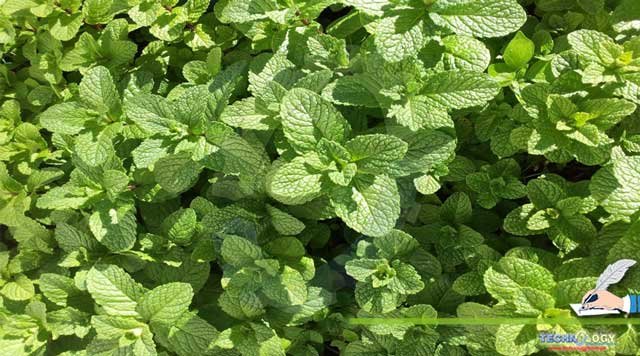Mint or Mentha belongs to the Lamiaceae family, which contains around 15 to 20 plant species, including peppermint and spearmint

By Muhammad Nauman Sultan, Masood Ahmad, Safura Bibi, Maria Naqve
Peppermint is one of the oldest and most highly regarded herbs for appeasing digestion and may also restore digestive efficiency. In addition, peppermint has been known as disorders improving including: analgesic, ulcerate-bloat, irritable bowel syndrome or gastrointestinal motility, and immune system stimulant. Peppermint essential oil has biological activities, such as antibacterial, antifungal and antioxidant properties. Peppermint essential oil stimulated immune system in broiler chicks. Furthermore, peppermint not only improved disorder’s digestive system, also peppermint and antioxidant effects. Moreover, peppermint was efficient in blood parameters improvement and immune system stimulation in birds. To achieve these goals with regard to sustainable medical uses, we reviewed a summary of introduction, history, active constituents physiological and pharmacology uses of peppermint with concerning on essential oil in this Article.
Importance of Mint
Mint is one of the oldest culinary herbs known to mankind. Its remarkable medicinal properties have made it one of the most commonly known and used herbs ever.
Health Benefits
Mint has been used in traditional medicine to treat a variety of ailments for many years. Unfortunately, there aren’t many human studies documenting the impact mint has on the body apart from digestion support and irritable bowel syndrome relief. With time, research could confirm that mint is useful in treating a wider variety of illnesses.
Brain Health
Consuming mint might promote brain health. One study found mint extracts have potential to treat Alzheimer’s symptoms, although more research is needed. Another study found that smelling peppermint could enhance memory and increase alertness, although it’s unknown if ingesting it has similar effects.
Digestive Health
When it comes to medicinal uses, mint is perhaps most popularly known as a remedy for digestive problems. Taking peppermint oil reduces abdominal pain and helps treat irritable bowel syndrome without producing side effects. Animal and in vitro studies suggest that mint leaves could have wider medicinal applications than those currently known. These types of studies have found that mint is able to kill bacteria, reduce stress, and fight cancerous tumor cells. Human trials will be required to determine if mint also has these effects on the human body.
Beats Stress and Depression
Mint is an essential part of aromatherapy. It’s strong and refreshing smell could help beat stress and rejuvenate mind. Mint has adapted genic properties that regulate cortisol levels and boost the body’s natural resilience to stress. Adaptogens help balance the body in whatever way is needed. By breathing in the aroma of mint, your mind is instantly calmed. According to studies, it also helps release small amount of serotonin in the brain that may help beat depression.
Medicinal Properties of Mint
Anti-Spasmodic Effect Peppermint
Mint is well known as anti-spasmodic. Although the mechanism the association are not understood; but it’s believed peppermint relaxes gastrointestinal smooth muscle by reducing calcium influx in both large intestine and jejunum. There is a study showing similar mechanism in animals. Hawthorn reported an action of peppermint essential oil or menthol on calcium channel blocking activity in atrial and papillary muscle or brain synaptosomes (rat) or atrial and papillary muscle (guinea pig) and retinal neurons (chick).
Anti-Bloat Effect of Peppermint
The peppermint essential oil pharmacological action (Anti-bloat) in humans are well cleared but although the mechanism of this association is not understood. The mechanism may be results of gas pressure reduce in stomach or to equal stomach gas pressure with esophagus. There is evidence showing effectiveness peppermint in decrease intestine gas. They showed the pills produced of peppermint decreased intestine gas pressure.
Gastrointestinal Motility
The spasmolytic action of peppermint oil was demonstrated on isolated rabbit and rat intestine. Studies showed peppermint essential oil benefit on gastrointestinal motility, although the mechanism of this association is not understood. A calcium antagonistic effect of menthol was found. Both gastric motility and secretion are affected by substanc many lines of evidence suggest that material plays an important action in nociception at the spinal level. Recent studies have shown a non-competitive prevent of the contraction response induced by 5-hydroxytryptamine and substance on isolated smooth muscle. Therefore; a neuronal site of action of peppermint oil could also be possible. Moreover, a direct epithelial site of action was observed on small intestinal enterocytes.
Skin and Mucus Membranes
Peppermint oil motivates cold receptors on the skin and good for dilates blood vessels, furthermore caused a sensation of coldness and an analgesic impact. Seem active principles of essential oils (menthol in peppermint) act as a digestibility enhancer, balancing the gut microbial ecosystem and stimulating the secretion of endogenous digestive enzymes and thus improve growth. There is evidence showing application mint as indigestion disorders and colonic spasms by reducing the gastrocholic reflux.
Antioxidant Properties
Antioxidants have been greatly used as food additives to supply protection against oxidative degradation of foods by free radicals. Antioxidants serve to maintain these highly reactive free radicals, thereby maintaining the structural and functional integrity of cells. The phenolic compounds may contribute directly to the antioxidant action; therefore, it is necessary to investigate total phenolic content. The amounts of total phenolic compounds were higher in ethanol extract while lowest for essential oil. Antioxidants are important for the immune defense and health of the humans and animals body. According report indicated that in vitro condition, Ethanolic extract of Menthe genera has noticeable antioxidant ability against various oxidative systems; moreover, this extract can be used as an accessible source of natural antioxidants in possible food supplement or in pharmaceutical industry.
Authors : Muhammad Nauman Sultan, Masood Ahmad, Safura Bibi, Maria Naqve Univeristy of Agriculture Faisalabad, Pakistan